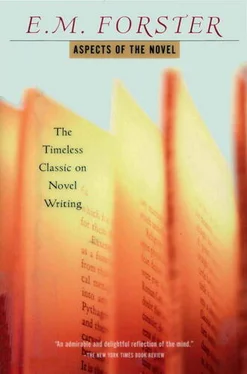I am trying not to be philosophic about time, for it is (experts assure us) a most dangerous hobby for an outsider, far more fatal than place; and quite eminent metaphysicians have been dethroned through referring to it improperly. I am only trying to explain that as I lecture now I hear that clock ticking or do not hear it ticking, I retain or lose the time sense; whereas in a novel there is always a clock. The author may dislike his clock. Emily Brontë in Wuthering Heights tried to hide hers. Sterne, in Tristram Shandy, turned his upside down. Marcel Proust, still more ingenious, kept altering the hands, so that his hero was at the same period entertaining a mistress to supper and playing ball with his nurse in the park. All these devices are legitimate, but none of them contravene our thesis: the basis of a novel is a story, and a story is a narrative of events arranged in time sequence. (A story, by the way, is not the same as a plot. It may form the basis of one, but the plot is an organism of a higher type, and will be defined and discussed in a future lecture.)
Who shall tell us a story?
Sir Walter Scott of course.
Scott is a novelist over whom we shall violently divide. For my own part I do not care for him, and find it difficult to understand his continued reputation. His reputation in his day—that is easy to understand. There are important historical reasons for it, which we should discuss if our scheme was chronological. But when we fish him out of the river of time and set him to write in that circular room with the other novelists, he presents a less impressive figure. He is seen to have a trivial mind and a heavy style. He cannot construct. He has neither artistic detachment nor passion, and how can a writer who is devoid of both, create characters who will move us deeply? Artistic detachment—perhaps it is priggish to ask for that. But passion—surely passion is low-brow enough, and think how all Scott's laborious mountains and scooped-out glens and carefully ruined abbeys call out for passion, passion and how it is never there! If he had passion he would be a great writer—no amount of clumsiness or artificiality would matter then. But he only has a temperate heart and gentlemanly feelings, and an intelligent affection for the country-side: and this is not basis enough for great novels. And his integrity—that is worse than nothing, for it was a purely moral and commercial integrity. It satisfied his highest needs and he never dreamt that another sort of loyalty exists.
His fame is due to two causes. In the first place, many of the elder generation had him read aloud to them when they were young; he is entangled with happy sentimental memories, with holidays in or residence in Scotland. They love him indeed for the same reason that I loved and still love The Swiss Family Robinson. I could lecture to you now on The Swiss Family Robinson and it would be a glowing lecture, because of the emotions felt in boyhood. When my brain decays entirely I shall not bother any more over great literature. I shall go back to the romantic shore where the "ship struck with a fearful shock," emitting four demigods named Fritz, Ernest, Jack and little Franz, together with their father, their mother, and a cushion, which contained all the appliances necessary for a ten years' residence in the tropics. That is my eternal summer, that is what The Swiss Family Robinson means to me, and is not it all that Sir Walter Scott means to some of you? Is he really more than a reminder of early happiness? And until our brains do decay, must not we put all this aside when we attempt to understand books?
In the second place, Scott's fame rests upon one genuine basis. He could tell a story. He had the primitive power of keeping the reader in suspense and playing on his curiosity. Let us paraphrase The Antiquary —not analyze it, analysis is the wrong method, but paraphrase. Then we shall see the story unrolling itself, and be able to study its simple devices.
THE ANTIQUARY
CHAPTER I
It was early in a fine summer's day, near the end of the eighteenth century, when a young man of genteel appearance, having occasion to go towards the north-east of Scotland, provided himself with a ticket in one of those public carriages which travel between Edinburgh and the Queensferry, at which place, as the name implies, and as is well known to all my northern readers, there is a passage-boat for crossing the Firth of Forth.
That is the first sentence in The Antiquary —not an exciting sentence, but it gives us the time, the place, and a young man—it sets the story-teller's scene. We feel a moderate interest in what the young man will do next. His name is Lovel, and there is a mystery about him. He is the hero or Scott would not call him genteel, and he is sure to make the heroine happy. He meets the Antiquary, Jonathan Oldbuck. They get into the coach, not too quickly, become acquainted, Lovel visits Oldbuck at his house. Near it they meet a new character, Edie Ochiltree. Scott is good at introducing fresh characters. He slides them very naturally, and with a promising air. Edie Ochiltree promises a good deal. He is a beggar—no ordinary beggar, a romantic and reliable rogue, and will he not help to solve the mystery of which we saw the tip in Lovel? More introductions: to Sir Arthur Wardour (old family, bad manager); to his daughter Isabella (haughty), whom the hero loves unrequited; and to Oldbuck's sister Miss Grizzle. Miss Grizzle is introduced with the same air of promise. As a matter of fact she is just a comic turn—she leads nowhere, and your story-teller is full of these turns. He need not hammer away all the time at cause and effect. He keeps just as well within the simple boundaries of his art if he says things that have no bearing on the development. Tne audience thinks they will develop, but the audience is shock-headed and tired and easily forgets. Unlike the weaver of plots, the story-teller profits by ragged ends. Miss Grizzle is a small example of a ragged end; for a big one I would refer to a novel that professes to be lean and tragic: The Bride of Lammermoor. Scott presents the Lord High Keeper in his book with great emphasis and with endless suggestions that the defects of his character will lead to the tragedy, while as a matter of fact the tragedy would occur in almost the same form if he did not exist—the only necessary ingredients in it being Edgar, Lucy, Lady Ashton and Bucklaw. Well, to return to The Antiquary, then there is a dinner, Oldbuck and Sir Arthur quarrel, Sir Arthur is offended and leaves early with his daughter, and they try to walk back to their own house across the sands. Tides rise over sands. The tide rises. Sir Arthur and Isabella are cut off, and are confronted in their peril by Edie Ochiltree. This is the first serious moment in the story and this is how the story-teller who is a story-teller handles it:
While they exchanged these words, they paused upon the highest ledge of rock to which they could attain; for it seemed that any farther attempt to move forward could only serve to anticipate their fate. Here then they were to await the sure, though slow progress of the raging element, something in the situation of the martyrs of the Early Church, who, exposed by heathen tyrants to be slain by wild beasts, were compelled for a time to witness the impatience and rage by which the animals were agitated, while awaiting the signal for undoing their grates and letting them loose upon the victims.
Yet even this fearful pause gave Isabella time to collect the powers of a mind naturally strong and courageous, and which rallied itself at this terrible juncture. "Must we yield life," she said, "without a struggle? Is there no path, however dreadful, by which we could climb the crag, or at least attain some height above the tide, where we could remain till morning, or till help comes? They must be aware of our situation, and will raise the country to relieve us."
Читать дальше












